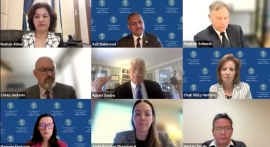
The American Bible Society (ABS) on Tuesday released Chapter Seven of its “State of the Bible USA 2025” report, offering a fresh look at how Americans assess trust in institutions, including religion and the Bible. The findings draw on an online survey of 2,656 U.S. adults conducted between Jan. 2 and Jan. 21.
When presented with the statement “the Bible is totally accurate in all the principles it presents,” 36% of respondents agreed, while 39% disagreed.
Among practicing Christians—defined as those who identify as Christian, attend church at least monthly, and regard their faith as “very important”—support for biblical inerrancy was overwhelming at 88%, with 4% disagreeing and the remainder unsure.
By contrast, among nominal Christians—people who identify as Christian but do not attend church at least once a month—32% said the Bible is not entirely accurate, compared to 29% who affirmed that it is.
Casual Christians—those who attend at least monthly but do not consider their faith “very important”—were more evenly divided: about 45% called the Bible totally accurate, while 23% disagreed. Among non-Christians, 70% did not agree that the Bible is totally accurate, and 12% took the opposite view.
Nearly a quarter of respondents (24%) agreed that “the Bible is just another book of teachings written by people that contains stories and advice,” a sentiment embraced by a majority of religious “nones” (60%).
Eighteen percent said they believe the Bible was “written to control or manipulate other people,” including 50% of “nones.” However, a majority (58%) of Americans agreed that “the message of the Bible has transformed my life.”
On a 0–4 trust scale—0 meaning “no trust” and 4 meaning “very high” trust—religion averaged 1.8.
Other institutions fared differently: families (2.4), medicine (2.2), and education (2.1) ranked higher, while arts and entertainment (1.6), business (1.6), government (1.2), and the media (1.1) trailed behind.
Overall, 17% of Americans reported “no trust” in religion, with even higher rates of “no trust” for government (22%) and the media (29%). Much smaller shares expressed “no trust” in families (3%), medicine (5%), and education (5%).
Breaking results out by Scripture engagement, those most Scripture-engaged—scoring highest on the scale that gauges the Bible’s centrality and impact—reported greater trust in family (2.7) than people in the movable middle and the Bible-disengaged categories (2.5).
A similar pattern emerged for trust in the Bible itself: the Scripture-engaged averaged 2.8, compared with 2.3 for the movable middle and 1.2 for the Bible-disengaged.



















